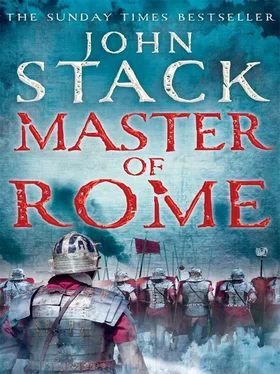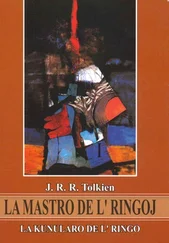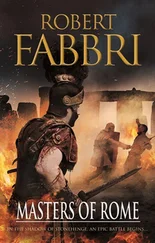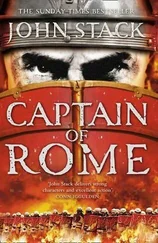John Stack - Master of Rome
Здесь есть возможность читать онлайн «John Stack - Master of Rome» — ознакомительный отрывок электронной книги совершенно бесплатно, а после прочтения отрывка купить полную версию. В некоторых случаях можно слушать аудио, скачать через торрент в формате fb2 и присутствует краткое содержание. Жанр: Исторические приключения, на английском языке. Описание произведения, (предисловие) а так же отзывы посетителей доступны на портале библиотеки ЛибКат.
- Название:Master of Rome
- Автор:
- Жанр:
- Год:неизвестен
- ISBN:нет данных
- Рейтинг книги:4 / 5. Голосов: 1
-
Избранное:Добавить в избранное
- Отзывы:
-
Ваша оценка:
- 80
- 1
- 2
- 3
- 4
- 5
Master of Rome: краткое содержание, описание и аннотация
Предлагаем к чтению аннотацию, описание, краткое содержание или предисловие (зависит от того, что написал сам автор книги «Master of Rome»). Если вы не нашли необходимую информацию о книге — напишите в комментариях, мы постараемся отыскать её.
Master of Rome — читать онлайн ознакомительный отрывок
Ниже представлен текст книги, разбитый по страницам. Система сохранения места последней прочитанной страницы, позволяет с удобством читать онлайн бесплатно книгу «Master of Rome», без необходимости каждый раз заново искать на чём Вы остановились. Поставьте закладку, и сможете в любой момент перейти на страницу, на которой закончили чтение.
Интервал:
Закладка:
As senior consul, Paullus had rushed to Sicily six months before, taking residence in the walled city of Agrigentum on the southern coast. From there he had sought to take command of the war in Sicily, to carve out a victory that would rival his predecessor’s triumph at Cape Ecnomus; but the enemy had withdrawn their naval forces south to Carthage and Paullus lacked the legionary army necessary to take the fight to the Carthaginians on land. He had led skirmishes to Panormus and Lilybaeum, the two main Carthaginian-held ports of Sicily, hoping to take the fight to the enemy, but his minor victories only served to deepen his frustration.
All eyes in Rome were on the conflict in Africa. There lay the glory, but Regulus had persistently evaded all efforts to recall him to Rome, his victories at Ecnomus and Adys giving him considerable support in the Senate, so he had maintained his position as commander of the expeditionary force. With defeat in Tunis, however, that command was no more, and Paullus couldn’t suppress his rising anticipation. When news of Regulus’s defeat had arrived from a supply ship that had escaped the harbour of Tunis, Paullus had immediately assembled the fleet to sail west, eager to take full advantage of his restored mandate.
Paullus made his way slowly to the aft-deck, surreptitiously watching the crew at work as he went, their frantic pace at odds with the consul’s unhurried movements. The consul had never before been on a galley sailing to Sicily but, over the previous months, he had learned all that was necessary to command a fleet, his two victorious skirmishes against the enemy confirming his belief in his natural ability to lead.
Paullus turned to look out over the length of the Concordia as he reached the aft-deck. The mainsail was taut against the rigging and, beyond that, the corvus boarding ramp stood poised. He breathed in the warm crosswind and looked across the deck. The junior consul, Servius Fulvius Paetinus Nobilior, was standing by the tiller and he nodded at Paullus, the senior consul returning the gesture before turning once more to the sea ahead, his mind already focused on his plan of attack once he reached Aspis. Audacity was the key to victory, and Paullus smiled as he imagined the fear that would sweep across the sea-lanes as news of his arrival spread.
The horizon before the Concordia darkened, a shoreline came slowly into view, and the call of land sighted echoed across the fleet. Paullus moved quickly to the foredeck, giving himself an uninterrupted view of the seascape and the shoreline beyond. A flicker of colour caught his eye and he focused on the intermittent movement. The crosswind caused his eyes to water and he rubbed them irritably. He saw them again, flashes of vibrant colours, stark against the dark shoreline, and he suddenly understood what he was seeing, the vivid masthead banners whipping furiously in the wind, their number growing with each oar stroke the Concordia took to narrow the distance. An instant later the lookout’s call confirmed his sighting.
‘Enemy galleys, dead ahead!’
‘Number and heading,’ Hamilcar roared as he ran the length of the Alissar.
‘At least three hundred,’ the lookout called. ‘Heading due west, directly for us.’
Hamilcar stopped as he came to the aft-deck and looked east to the approaching galleys. But for their masthead banners they could be Carthaginian ships, their design a copy of the galleys constructed by the master shipbuilders of Carthage, and Hamilcar cursed the sight. He looked over his shoulder to the inner harbour of Aspis and the forty Roman galleys that still faced him defiantly.
The deadline he had imposed was but hours away, and he reproached Tanit for her fickle nature. Many times during the preceding night he had been tempted to retract his proposal and order a full attack. He knew that tactically it would be a mistake, but his honour demanded a measure of retribution for the defeat inflicted on him and his men at Ecnomus. The Alissar had been his command ship on that day, the quinquereme in the vanguard of the main attack, a position of honour that Hamilcar had assumed with pride but one which had become forever tainted with humiliation when he had ordered the Alissar to lead the retreat from Ecnomus.
Many of the galleys of the blockade had been in battle that day and, even a year later, the shock of defeat still lay heavy on the morale of the crews, another reason why Hamilcar had been tempted to attack Aspis. A fight in the inner harbour would be on the Romans’ terms, and Hamilcar’s gains would be negated by his losses, but success was nevertheless assured by numbers alone. Hamilcar knew his men needed a victory over the hated Roman fleet that many perceived to be indomitable.
He had been racked with indecision during the night, perhaps touched by the same lack of confidence that was endemic in his fleet. Now fortune had swung against him, punishing him for his hesitancy, and Hamilcar looked once more to the east and the approaching Roman galleys, a quiet determination stealing over him.
The proximity of combat cleared his mind of any further thoughts of what might have been. He was outnumbered, and the enemy was on two sides. He could not hope to hold his position at the mouth of the harbour. Defeat would be certain. Equally he couldn’t order his fleet to disperse, knowing that fleeing before a blow had been struck would be the death knell of his command.
He would have to take the fight to the Romans, but first he needed to reduce the odds against him. He closed his eyes and pictured the surrounding coastline in his mind’s eye, searching his store of local knowledge of the shores around his beloved Carthage. He opened his eyes and checked the height of the tide on the nearby shoreline. He looked to the north, his mouth hardening into a thin line, his previous hesitation forgotten, and he turned to the helmsman.
‘Come about,’ he ordered. ‘Battle speed. Signal the fleet to form up on the Alissar. We sail for Cape Hermaeum.’
The helmsman nodded and sent a runner to signal the fleet as he put his weight behind the tiller, the quinquereme responding instantly to the rudder as the galley broke the formation of the blockade. Hamilcar leaned into the turn, his hand on the siderail as the drum beat intensified, the Alissar increasing speed to eight knots within a ship-length while all around him the galleys of his command responded in kind.
‘Aspect change on the blockade!’
‘All hands, make ready,’ Atticus shouted at the lookout’s call, quickly running to the foredeck to see the course change of the blockading galleys for himself. He stood poised to issue the order for battle stations, expecting to see the Carthaginians turning into attack, but instead their bows swung north, the blockade rapidly disintegrating.
‘Galleys approaching from the east!’
Atticus heard the call and tried to see past the Carthaginian ships, their hulls blocking his view of the eastern horizon. He looked to Corin, the masthead lookout, the young man’s gaze locked on the distant seascape.
‘Identify, Corin,’ Atticus shouted, his inadequate vantage point frustrating him. Was it another Carthaginian detachment? Maybe the blockading galleys were moving to redeploy for attack. Every passing minute counted, and Atticus had to fight the overwhelming urge to go aloft and see for himself. He focused on Corin’s face, and saw the answer a second before the lookout responded.
‘They’re Roman, Prefect.’
Atticus turned to look for his second-in-command, seeing him on the main deck. ‘Baro,’ he called. ‘Get us under way. Battle speed.’
Baro nodded and began shouting orders to the crew, their already frenzied pace increasing with the ferocity of his voice. Atticus moved quickly to the aft-deck as the Orcus lurched beneath him, her oars biting into the calm waters of the inner harbour, the galley increasing speed with every drum beat.
Читать дальшеИнтервал:
Закладка:
Похожие книги на «Master of Rome»
Представляем Вашему вниманию похожие книги на «Master of Rome» списком для выбора. Мы отобрали схожую по названию и смыслу литературу в надежде предоставить читателям больше вариантов отыскать новые, интересные, ещё непрочитанные произведения.
Обсуждение, отзывы о книге «Master of Rome» и просто собственные мнения читателей. Оставьте ваши комментарии, напишите, что Вы думаете о произведении, его смысле или главных героях. Укажите что конкретно понравилось, а что нет, и почему Вы так считаете.










